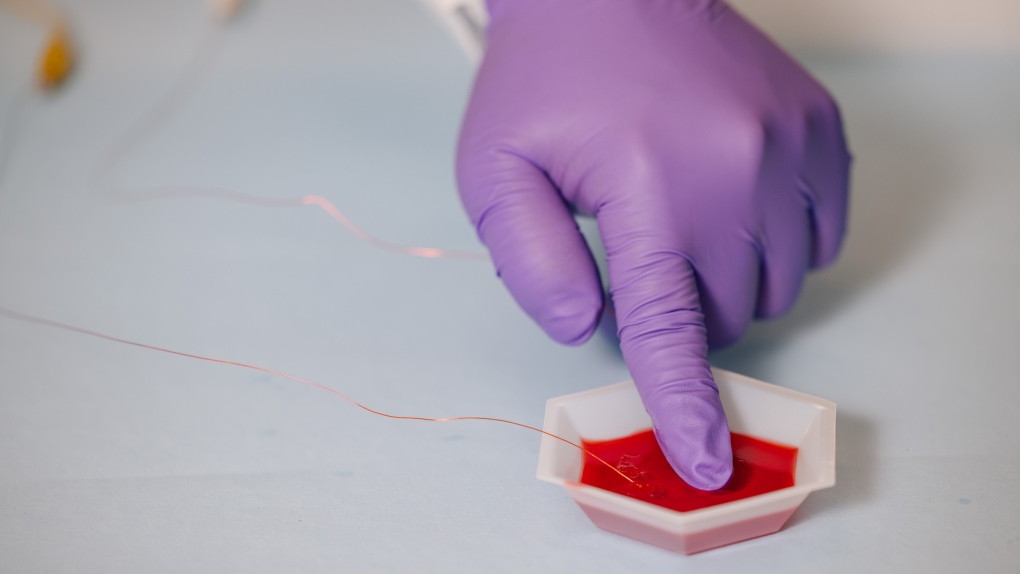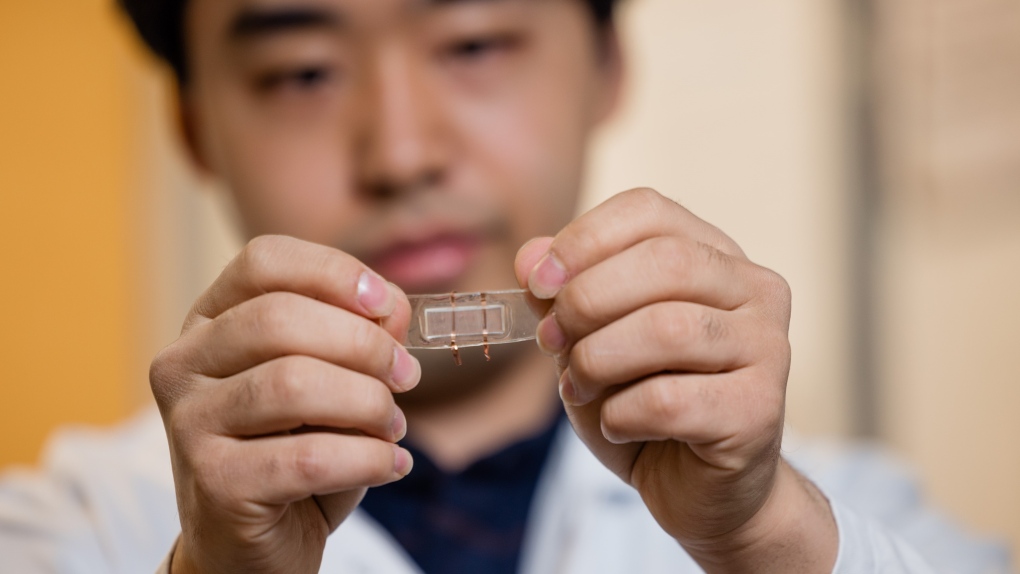How jelly is playing a role in the creation of a substance that can mimic natural skin
 Researchers use a jelly dessert to demonstrate how ions move in hydrogels. (Kai Jacobson/UBC Faculty of Applied Science)
Researchers use a jelly dessert to demonstrate how ions move in hydrogels. (Kai Jacobson/UBC Faculty of Applied Science)
A group of scientists is working to design a material that can mimic the ability of human skin to sense touch, and they're using a dessert popular with children and hospital cafeterias to do it.
It sounds futuristic, but the research being conducted at the University of British Columbia would offer a wearer of a prosthetic arm or robotic hand a more natural, comfortable feel.
Most so-called "smart skins" are made of metals and plastics, but some, called ionic skins, are made of more flexible materials.
These hydrogels use ions to carry an electrical charge, meaning when they're touched, the "skin" can generate voltages. This was known, according to a news release from UBC summarizing the team's peer-reviewed work that was published Thursday, but what was unclear is how this happened.
So a then-master's student in the biomedical engineering program at the University of British Columbia came up with a way to incorporate different sized hydrogel sensors into the skin.
The student, Yuta Dobashi, then worked with others in the school's physics and chemistry departments to apply magnetic fields. What this did was allow them to monitor how the ions moved.
And to demonstrate this movement, they used an unlikely substance: a jelly dessert, similar to what kids might take to school as a lunchtime treat, or what a hospital might serve its patients.
"When pressure is applied to the gel that pressure spreads out the ions in the liquid at different speeds, creating an electrical signal," Dobashi said in the UBC news release. Dobashi is now completing his PhD in Toronto, but started the work while getting his master's.
Because positive and negative ions, contained in salt inside the sensors, move at different speeds, "this results in an uneven ion distribution, which creates an electric field," he said.
This answered the "how" question scientists had.
For those less familiar with the concept, the researchers said what it means is that these hydrogels used in ionic skins actually work in a similar way to human skin. Ions move then, too, in response to pressure.
It's exciting news for those who see the implications of the work.
According to an electrical and computer engineering professor at UBC who oversaw the work, it means sensors could be created that would be able to interact with the nervous system.
"You can imagine a prosthetic arm covered in an ionic skin. The skin senses an object through touch or pressure, conveys that information through the nerves to the brain, and the brain then activates the motors required to lift or hold the object," John Madden said.
"With further development of the sensor skin and interfaces with nerves, this bionic interface is conceivable."
Another way the science could be used is to monitor a hospital patient's pulse, blood pressure and temperature, rather than the systems used in hospitals currently.
At some point too, these jelly-like materials could be used for implants such as artificial knees and hips, and they could even release drugs based on how much pressure it senses.
The research was published in Science, an academic journal published by the American Association for the Advancement of Science that has been around since the late 1800s.
 Study lead author Yuta Dobashi, a graduate of UBC's master in biomedical engineering program, is shown. (Kai Jacobson / UBC Faculty of Applied Science)
Study lead author Yuta Dobashi, a graduate of UBC's master in biomedical engineering program, is shown. (Kai Jacobson / UBC Faculty of Applied Science)
CTVNews.ca Top Stories

U.S. president-elect's son shares post on X of Donald Trump buying Canada on Amazon
U.S. president-elect Donald Trump and those in his corner continue to send out strong messages about Canada.
Economists say more room to fall as Canadian dollar continues downward trend
Experts say the next few months are going to be rough for the Canadian dollar as it appears set to continue its downward trend.
Heavy travel day off to a rough start after American Airlines briefly grounds all flights
American Airlines briefly grounded flights nationwide Tuesday due to a technical issue just as the Christmas travel season kicks into overdrive and winter weather is threatening more potential problems for those planning to fly or drive.
Trudeau could stay or go. Either way, Canadians should brace for a spring election
Canada appears to be barrelling toward a spring election now that the NDP is vowing to vote down the government early next year -- whether Prime Minister Justin Trudeau stays on or not.
How much is too much alcohol over the holidays? A doctor explains
The holidays are here, as are the parties, happy hours and other get-togethers that often offer abundant mixed drinks, beer and wine.
Balkans snowstorm leaves tens of thousands of homes without power and causes traffic chaos
Tens of thousands of homes in Bosnia were without electricity on Tuesday after heavy snow and winds that also brought traffic chaos in neighbouring Croatia and Serbia.
The Santa Awards: Ranking the best (and most ridiculous) Father Christmases ever to grace our screens
Behold, for your festive perusal, some of the most beloved, cherished and out-there onscreen renditions of dear old Saint Nick.
Norad crew waiting for Santa to fly over Canada as annual holiday track underway
Departing from the North Pole while we were all sleeping, Santa Claus' journey around the world bringing presents and Christmas cheer for all of the good boys and girls who believe is underway.
'I became fluent in Bob': How the costume designer of 'A Complete Unknown' transformed Timothee Chalamet
If fashion is a language, Arianne Phillips, costume designer on James Mangold's latest film 'A Complete Unknown,' is a polyglot.
































